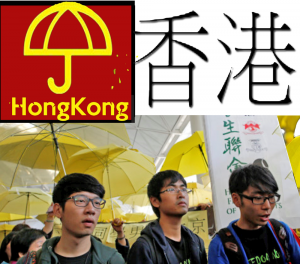
As China breaks up the last of the demonstrations in Hong Kong, Beijing has assumed the throne as the world’s largest economy.
China has just overtaken the United States as the world’s largest economy.
Meanwhile China is evicting the last of the demonstrators in Hong Kong. Who is still on Hong Kong’s streets?
Nobel Laureate Joseph E. Stiglitz explains what this means in Vanity Fair.
Excerpts:
“2014 was the last year in which the United States could claim to be the world’s largest economic power. China enters 2015 in the top position, where it will likely remain for a very long time, if not forever. In doing so, it returns to the position it held through most of human history.”
“For America, the best response to China is to put our own house in order.”
“China is not so eager (for this status).” .”The news about China’s change in status was in fact blacked out at home.”
“—being No. 1 comes with a cost. It means paying more to support international bodies such as the United Nations. It could bring pressure to take an enlightened leadership role on issues such as climate change. It might very well prompt ordinary Chinese to wonder if more of the country’s wealth should be spent on them. ”
“The two countries have comparable levels of inequality. (Ours is the highest in the developed world.) China outpaces America in the number of people executed every year, but the U.S. is far ahead when it comes to the proportion of the population in prison (more than 700 per 100,000 people). China overtook the U.S. in 2007 as the world’s largest polluter, by total volume, though on a per capita basis we continue to hold the lead.”
“(After WWII) the United States … inferred that its triumph meant a triumph for everything it stood for. But in much of the Third World, concerns about poverty—and the economic rights that had long been advocated by the left—remained paramount.
“(After WWII the United States) use(d) the short period …between the fall of the Berlin Wall and the fall of Lehman Brothers, to pursue its own narrow economic interests—or, more accurately, the economic interests of its multi-nationals, including its big banks—rather than to create a new, stable world order. …… Talking about free and fair trade, while insisting (for instance) on subsidies for its rich farmers, has cast the U.S. as hypocritical and self-serving.
” The rise of China to No. 1 brings new prominence to that country’s political and economic model—and to its own forms of soft power. The rise of China also shines a harsh spotlight on the American model. That model has not been delivering for large portions of its own population. The typical American family is worse off than it was a quarter-century ago, adjusted for inflation; the proportion of people in poverty has increased. China, too, is marked by high levels of inequality, but its economy has been doing some good for most of its citizens. China moved some 500 million people out of poverty during the same period that saw America’s middle class enter a period of stagnation. An economic model that doesn’t serve a majority of its citizens is not going to provide a role model for others to emulate. America should see the rise of China as a wake-up call to put our own house in order.”
Another example: the …China wants to take on a larger role in existing international institutions, but Congress says, in effect, that the old club doesn’t like active new members: (China) can continue taking a backseat, but they can’t have voting rights commensurate with their role in the global economy. When the other G-20 nations agree that it is time that the leadership of international economic organizations be determined on the basis of merit, not nationality, the U.S. insists that the old order is good enough—that the World Bank, for instance, should continue to be headed by an American.”
“And a final example: the U.S. has sought to deter China’s efforts to channel more assistance to developing countries through newly created multilateral institutions in which China would have a large, perhaps dominant role. ”
” Given historical memories and its own sense of dignity, China won’t be able to accept the global system simply as it is, with rules that have been set by the West, to benefit the West and its corporate interests, and that reflect the West’s perspectives. We will have to cooperate, like it or not—and we should want to. In the meantime, the most important thing America can do to maintain the value of its soft power is to address its own systemic deficiencies—economic and political practices that are corrupt, to put the matter baldly, and skewed toward the rich and powerful.”